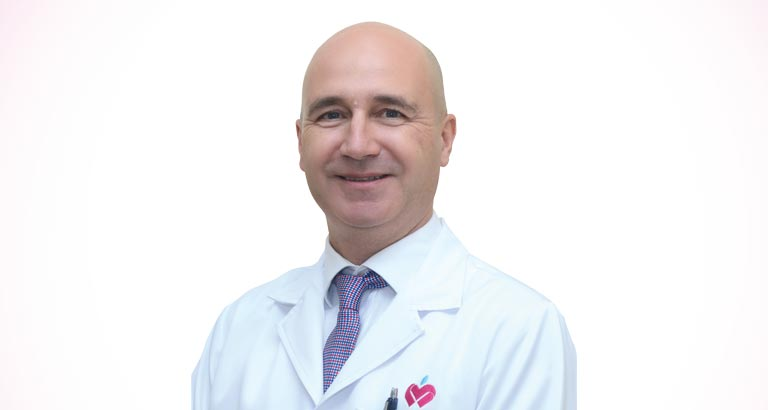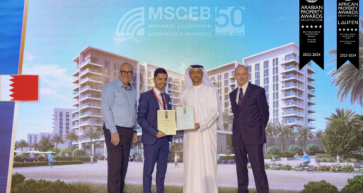
Consultant gastroenterologist Dr Nenad Vanis of Middle East Hospital (MEH) talks about his career and gastroenterology treatment.
Tell us about yourself?
I was born in London, UK, in 1967. Then, my family moved to Sarajevo [Bosnia Herzegovina] where I finished my education. I worked as a physician at the largest clinical centre in Bosnia and Herzegovina for over 25 years. I have been here in Bahrain for more than two and a half years, with the last year at Middle East Hospital. I'm married and I have a wonderful 23-year-old son, who is studying at medical school in Sarajevo.
What is your experience in the field of gastroenterology?
When I was a student, I wanted to be a gastroenterologist. I did my master's thesis in the University of Sarajevo. My postgraduate studies were at the Faculty of Medicine at University of Sarajevo and I also did my PhD there. After that I specialised in internal medicine and sub-specialised in gastroenterology and haematology. I am also a professor of internal medicine at the University of Sarajevo and I’ve finished advanced health management at the Faculty of Economics at Sarajevo University.
When I finished medical school, I was a physician in the Bosnian Army from 1992 to 1995. After the war, I worked as head of the gastroenterology department [60 beds] at Clinical Centre University of Sarajevo and I was a medical director at Clinical University Centre with 2,000 hospital beds and more than 800 doctors. I am currently working as a gastroenterologist consultant in the Clinic of Gastroenterology and Hepatology at Middle East Hospital.
I’ve published more than 100 reviewed monographs, chapters in university books, clinical guidelines, original articles, publications, professional and review articles, as well as abstracts as the first author in accordance with the relevant medical databases. I have been involved in more than 10 medical international projects. I’ve attended more than 100 international congresses, workshops, symposia and conferences.
What are the common issues and problems in gastroenterology and hepatology?
Gastroenterologists have extensive training in the diagnosis and treatment of conditions that affect the oesophagus, stomach, small intestine, large intestine [colon] and biliary system [liver, pancreas, gallbladder, bile ducts]. Gastroenterology is a subspecialty of internal medicine. Common digestive problems include heartburn, bloating, diarrhoea, constipation, nausea and vomiting, gas, abdominal pain and stomach cramps. Some of the most common gastrointestinal disorders that we notice in Bahrain are gastroesophageal reflux disease, irritable bowel syndrome, gastritis, peptic ulcer disease, gall bladder and common bile duct stones, inflammatory bowel disorders [Crohn’s disease and ulcerative colitis], cancers of the colon, stomach, liver and pancreas, liver cirrhosis, hepatitis B and C infections, fatty and alcoholic liver disease, et cetera.
What are the factors that influence GI disease?
A variety of gastrointestinal diseases cause gastrointestinal problems. Some digestive diseases can be easily remedied with a change in diet or with over-the-counter medications, but some can be life threatening and require surgery.
Some risk factors are consistent for most digestive diseases: high-fat diets, regular use of junk food, lack of fibre and vegetables or fruits in the diet, obesity, eating foods that irritate the digestive system, lack of exercise, allergies, stress, genetic diseases, alcohol abuse, smoking, lack of exposure to sunlight, abdominal trauma, medications – especially aspirin – conditions like diabetes mellitus, hyperthyroidism, cancers, pregnancy and surgery.
What kind of gastroenterology procedures are done at Middle East Hospital?
A gastroenterologist is a physician with dedicated training and unique experience in the management of diseases of the gastrointestinal tract and liver. We specialise in the evaluation, diagnosis, management and treatment of the following symptoms and conditions: abdominal pain and discomfort, heartburn, stomach upset, nausea, vomiting, constipation and diarrhoea, difficulty swallowing, hiatal hernias, diverticular disease and other diseases of the colon [polyps, irritable bowel syndrome, colitis, Crohn's disease], ulcers, inflammation in the digestive tract [gastritis], gallbladder disease, liver disease [hepatitis, fatty liver jaundice], cancer [colorectal cancer, stomach cancer, pancreatic cancer, liver cancer], haemorrhoids, malabsorption disorders [celiac disease, lactose intolerance], unexplained weight loss and bleeding in the digestive tract.
We do biopsy, removal of polyps and advanced chromoendoscopy during regular upper gastrointestinal endoscopy and colonoscopy to detect subtle changes of malignancy. Routine and endoscopic ultrasound services are available to diagnose and perform guided fine-needle aspiration biopsy of lesions. We also do double balloon enteroscopy, which is useful in the evaluation of small intestinal diseases, and is available only in our department in Bahrain.
What is your message to the people of Bahrain?
Prevention is better than cure! Many problems can be completely prevented, but not many can be completely cured. Also, prevention is cheap and easy, but cure can be terribly expensive and painful. This is true in essentially all aspects of life. Prevention is the key to staying healthy.
These are only a few of the lifestyle and dietary changes recommended by us: cut high-fat and acidic foods from your diet; eat a high-fibre, healthy diet; avoid fizzy drinks; eat and drink slowly; avoid sweeteners; quit smoking; avoid alcohol use; exercise lightly five days each week; and avoid daily aspirin use [unless told otherwise by your doctor].
All individuals above the age of 50 should undergo colon cancer screening using colonoscopy.



